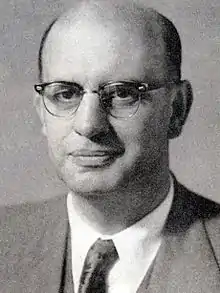6th Cabinet of Republic of South Africa (since 1961 Constitution) | |
| 1981 | |
 P.W. Botha (1962) | |
| Date formed | 29 April 1981 |
| Date dissolved | 3 September 1984 |
| People and organisations | |
| Head of state | President Marais Viljoen (acting) |
| Head of government | Prime Minister P.W. Botha (position merged with Presidency in 1984) |
| Status in legislature | Majority |
| Opposition party | Progressive Federal Party |
| Opposition leader | Frederik van Zyl Slabbert |
| History | |
| Election(s) | 1981 |
| Legislature term(s) | 3 years, 4 months and 5 days |
| Predecessor | Vorster III |
| Successor | Botha II |
When P.W. Botha first became Prime Minister of South Africa in 1981, he appointed members of the National Party to positions in his first Cabinet.
Cabinet
| Portfolio | Minister | Party | Period |
|---|---|---|---|
| Prime Minister | P.W. Botha | NP | 1978–1984 |
| Vice President (abolished 1984) | Alwyn Schlebusch[1] | NP | 1981–1987 |
| Agriculture and Fisheries | Hendrik Schoeman Sarel Hayward | NP | 1978–1982 1982–1984 |
| Constitutional Development | Chris Heunis | NP | 1982–1984 |
| Cooperation and Development | Piet Koornhof | NP | 1978–1984 |
| Defense | P.W. Botha Magnus Malan | NP | 1978–1980 1980–1984 |
| Education and Training | Ferdinand Hartzenberg Dawie de Villiers | NP | 1979–1982 1982 |
| (National) Education | Gerrit Viljoen[2] | NP | 1980–1984 |
| Environment and Energy | Chris Heunis F.W. de Klerk Braam Raubenheimer Cornelis van der Merwe Sarel Hayward | NP | 1978–1979 1979–1980 1980 1981–1982 1982–1984 |
| Finance | Owen Horwood[3] | NP | 1978–1984 |
| Foreign Affairs | Pik Botha[3] | NP | 1978–1984 |
| Health | Schalk van der Merwe | NP | 1978 |
| Home Affairs | Alwyn Schlebusch Chris Heunis F.W. de Klerk | NP | 1978–1980 1980–1982 1982–1984 |
| Justice | Jimmy Kruger Alwyn Schlebusch Kobie Coetsee[2] |
NP | 1978–1979 1979–1980 1980–1984[4] |
| Labour | Fanie Botha | NP | 1979–1983 |
| Mining | Fanie Botha F.W. de Klerk Pietie du Plessis Daniel Steyn | NP | 1978–1979 1979–1982 1982–1983 1983–1984 |
| Plural Development | Stephanus François Kotzé | NP | 1980–1984 |
| Police and Prisons Law and Order | Jimmy Kruger Louis le Grange | NP | 1978–1979 1979–1984 |
| Public Works | Louis Le Grange Andries Treurnicht | NP | 1978–1979 1979–1980 |
| Posts en Telegraphs | Henni Smit F.W. de Klerk Lourens Munnik | NP | 1978 1978–1979 1982–1984 |
| Sport and Recreation | Piet Koornhof F. W. de Klerk | NP | 1978 1978–1979 |
| Statistics | Andries Treurnicht | NP | 1979–1982 |
| Tourism | Louis Le Grange Andries Treurnicht | NP | 1978–1979 1979–1980 |
| Trade and Industry | Dawie de Villiers | NP | 1980–1984 |
| Transport | Lourens Muller Chris Heunis Hendrik Schoeman | NP | 1978–1979 1979–1980 1980–1984 |
| Water and Forestry | Braam Raubenheimer | NP | 1978–1980 |
| Welfare Health, Welfare and Pensions | F.W. de Klerk Schalk van der Merwe Lourens Munnik Cornelis van der Merwe | NP | 1978 1978–1979 1980–1982 1982–1984 |
References
- ↑ Rotberg, Robert (2002). Ending Autocracy, Enabling Democracy: The Tribulations of Southern Africa, 1960–2000. Washington, D.C.: Brookings / World Peace Foundation. pp. 341. ISBN 978-0-8157-7583-6.
- 1 2 Rotberg, Robert (2002). Ending Autocracy, Enabling Democracy: The Tribulations of Southern Africa, 1960–2000. Washington, D.C.: Brookings / World Peace Foundation. pp. 333. ISBN 978-0-8157-7583-6.
- 1 2 Rotberg, Robert (2002). Ending Autocracy, Enabling Democracy: The Tribulations of Southern Africa, 1960–2000. Washington, D.C.: Brookings / World Peace Foundation. pp. 335. ISBN 978-0-8157-7583-6.
- ↑ Sparks, Allister (1995). Tomorrow is Another Country: The Inside Story of South Africa's Road to Change. Chicago: University of Chicago Press. p. 16. ISBN 978-0-226-76855-7.
This article is issued from Wikipedia. The text is licensed under Creative Commons - Attribution - Sharealike. Additional terms may apply for the media files.